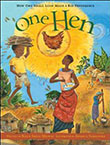One Hen: How One Small Loan Made a Big Difference Q&A

Use these questions to discuss the economic concepts in One Hen: How One Small Loan Made a Big Difference with children 8 to 10 years old: entrepreneur, loan, and saving.
View all of our Parent Q&A resources.
Teachers: View the lesson plan using One Hen: How One Small Loan Made a Big Difference.
Book written by by Katie Smith Milway (ISBN: 978-1-55453-028-1).
Questions:
1. Saving means putting money aside to buy goods or services later. Why did the families of the village decide to save money, even though they didn’t earn very much?
Each family decided to save a bit of money so that one family could borrow all the savings to buy something to help that family earn more money.
2. A loan is a sum of money provided temporarily on the condition that the amount borrowed be repaid, usually with interest. What did the families buy with the money borrowed from the village?
Fruit, a cart, and a second-hand sewing machine.
3. One day it was Kojo’s mother’s turn to borrow money. Kojo asked for a few coins from his mother to buy something to start a business because he had an idea. What was Kojo’s idea?
Kojo wanted to buy a hen so he and his mother could eat some of the eggs the hen laid and then sell the rest at the market to earn income.
4. How did the one hen Kojo bought ultimately lead to Kojo going to school?
Kojo sold eggs to earn income. He saved some of his income—the money he earned—and bought more and more hens until he finally had 25 hens. Once he earned enough money, he was able to pay to go back to school.
5. Entrepreneurs are people willing to take risks to develop new products and start new businesses. They recognize opportunities, enjoy working for themselves, and accept challenges. What other characteristics do you think helped Kojo become an entrepreneur?
Kojo was responsible and took good care of his chickens. He was hardworking, educated, and goal-oriented. He was a saver, so he had money to expand his business over time.
6. What obstacle did Kojo encounter in his plan to start a poultry farm, and how did he overcome it?
Kojo was turned down when he requested a large loan to purchase the larger poultry farm. He went to another city and asked the bank president for a loan, who then gave it to him.
7. How did one hen ultimately change the lives of many people?
Kojo started his business with one hen. His business kept growing, and he eventually bought a poultry farm that provided jobs for 120 people and eggs for many people.
8. Have you ever borrowed money from someone and then paid it back?
Answers will vary.
9. Why is it important to pay back a loan?
When you pay back a loan, you show responsibility and it may make it easier for you to borrow money in the future.
---
If you have difficulty accessing this content due to a disability, please contact us at 314-444-4662 or economiceducation@stls.frb.org.

